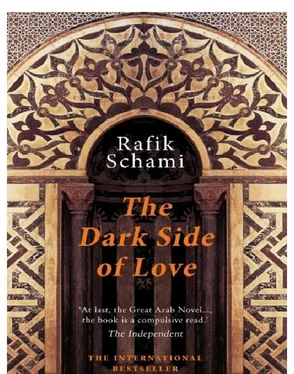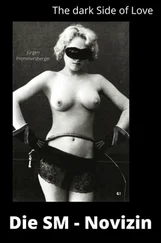“Yes, sure. You’re right. That’s what we’ll do. I don’t want that criminal Mushtak to misinterpret your brother’s kindness of heart and his amnesty and go underground again.”
“No, you’re there to prevent that very thing,” said Badran, laughing.
When Mahdi hung up, he was glad to think that Badran cared whether or not he was happy. So he wasn’t quite so unimportant after all. None the less, he decided to go and see the general. Having finally come to this decision, he smiled. He felt that he too was capable of icy, cutting cold.
278. The Visit
Claire shed tears of joy. Farid took her in his arms and kissed her eyes again and again. “I can always rely on you,” he whispered. A soldier was sitting in the corner, observing them both closely.
“How did you get here?” he asked in some surprise.
“My driver dropped everything to bring me. Now he’s waiting patiently outside the door for a couple of hours,” she said, wiping away her tears with a handkerchief.
“What — my father’s outside?” asked Farid in surprise.
“Yes, but the camp commandant wouldn’t let him see you. The permission was only for me,” she said.
When Claire had to leave the camp at about one in the afternoon, Elias was standing in the narrow area of shade provided by a wall. The sun was blazing mercilessly down, and there wasn’t a tree in sight. Claire kissed him and walked quickly to the car. She didn’t say a word until they had reached the main road.
“The camp commandant is Musa Shahin’s son. Musa who was shot by your brother Hasib in 1941. Do you remember the little boy?”
In sombre mood, Elias shook his head.
“His mother came from the north, and as a widow she went back to her parents. He’s been calling himself Mahdi Said since he converted to Islam.”
“One of those despicable Shahins,” retorted Elias, and spat scornfully out of the window.
“Yes,” said Claire, and she took two folded notes out of her pocket. She had felt Farid swiftly slipping them in as she said goodbye. The soldier had been busy at the door for a moment, impatiently complaining that he wanted to go for his lunch break.
Both notes were for her. In the first he asked her to tell Rana that he would soon be out of Tad, and then he wanted to be with her for ever. In the second, he wanted her to let Matta know that Mahdi Said was none other than the monastery pupil Bulos, and he was now living in the Christian quarter of Damascus, although no more could be found out in the camp.
Claire wondered what the meaning of this second note might be, but Matta beamed. “Yes, we were inseparable, and Farid knows that Bulos would never turn down any request of mine.”
“Perhaps Farid’s afraid that bastard will do something else to hurt him before he’s released,” Elias surmised. “But how can we find out exactly where the man lives?”
“Never fear, Matta will do it,” said that faithful friend. And within three days Matta had indeed found out where Mahdi Said lived.
Love is the only sickness whose victims don’t want a cure.

THE AL-ASFURIYE PSYCHIATRIC HOSPITAL, 15 KM NORTH OF DAMASCUS, SPRING 1968 — SUMMER 1969
279. In the House of Sparrows
Dr. Edward Salam, a small, frail, elderly figure, was waiting at the entrance to the psychiatric hospital. The only thing about him that shone perfectly was his bald patch. He was there to receive Rana personally. It was a sign of special cordiality, and he wanted his staff to notice it.
Rana’s mother and brother seemed to be in a hurry. As soon as the medical director had greeted his patient they drove away. Dr. Salam thought Rana was as pretty as a picture. Her pallor gave her face an almost angelic look.
The friendship between Rana’s father, that well-known lawyer Basil Shahin, and Dr. Salam was of long standing. They had both been members of the Rotary Club until it was banned in 1965. His friend had often spoken enthusiastically to Dr. Salam of his daughter’s clever mind, so he had expected that his patient would seem rather severe and mannish. All the clever women he had met during his studies and his practice of psychiatry had lacked feminine beauty.
“A room in my own department,” he quietly told a male nurse who briefly met him outside his office. “We’ll drink a coffee, and then Rana can rest for a while,” he added, opening the door.
Rana entered a spacious office with pot plants in it. The cardamom-flavored coffee that the red-haired head nurse brought them tasted really good for a hospital.
What a difference from her first stay in this place ten months ago, when she had been treated like an animal!
“Would you like something to read?” asked Dr. Salam.
“No thank you. I feel so tired,” replied Rana almost inaudibly.
She closed her eyes for a moment. Where’s Farid? she wondered. What are they doing to him? She felt a small hand on her shoulder. Dr. Salam was smiling at her. Had she dropped off to sleep?
“You can rest now. We’ll talk a little tomorrow,” he told her kindly.
Her room was small, clean, and bright: a bed, a narrow table, a shower and a separate lavatory. The barred window faced south. Outside, a gardener was pruning a wild oleander bush.
She lay down on the bed. Someone had scratched the outline of a sailing boat on the wall. It could be made out only indistinctly. Two letters mysteriously adorned the sail: A.L.
She sat up and looked at her trembling hands. A male nurse knocked, came in, and gave her a mug of steaming tea and a tiny dish with two tablets in it. The tea tasted horrible, the tablets bitter. She looked out of the window. Where’s Farid now? she asked herself again, and lay down. She glanced at her watch, the watch she had worn ever since her elopement to Beirut with Farid fifteen years ago. He had bought it for her with his first wages. Whenever she looked at the watch she felt a pleasant little tickle in her right ear. Back then, Farid had kissed her ear as she put the watch on.
A leaden weariness overcame her, probably induced by the tablets. She didn’t want to sleep, and tried to raise herself from the pillow. But then later she heard another knock and woke up. The red-haired nurse was standing in the doorway. Rana turned her face to the window. It was full daylight. How long had she been asleep?
“Dr. Salam would like to speak to you,” said the woman, tight-lipped.
When she entered his room, he came out in front of his desk and offered her his hand. A scent of rosewater preceded him.
“I don’t like this woman. She doesn’t mean well,” said Rana, but he didn’t seem to have heard her.
“Come along, let’s sit down,” he said. “Kadira, could you bring us a pot of coffee?” And as soon as the nurse had left the room, he said, “I’d like to listen to anything you have to say at your leisure, so that I can understand you and help you.” He led her to the comfortable chair where she was to sit opposite him. Evidently she wasn’t expected to lie on a couch, as she had with the psychiatrist last year.
Looking at her with his clever little eyes, he smiled. Two lines at the corners of his mouth emphasized his friendliness.
“I’m thinking of a woman who was once a neighbour of mine,” Rana began, hesitantly and quietly. “You remind me of her. She had a kind face like yours, and she was delicately built too.” Dr. Salam smiled. “She sang me the only song I knew as a small child. My mother never sang to me. But one day my parents wanted to go out with friends to celebrate something in a restaurant, and they asked our neighbour to come and look after me and Jack. Jack was three then and I was five. He went to sleep at once, but I was too excited. I watched the old woman and her kind face, feeling curious about her. Then she began to sing. She sang a song that made me laugh, and after that …” Rana stopped, and began crying. Dr. Salam took the coffee pot that was brought in and poured two cups. Then he leaned over the little table with the tray where the full coffee cups stood with steam rising from them. Rana took one, thanked him quietly, and wiped away her tears.
Читать дальше













